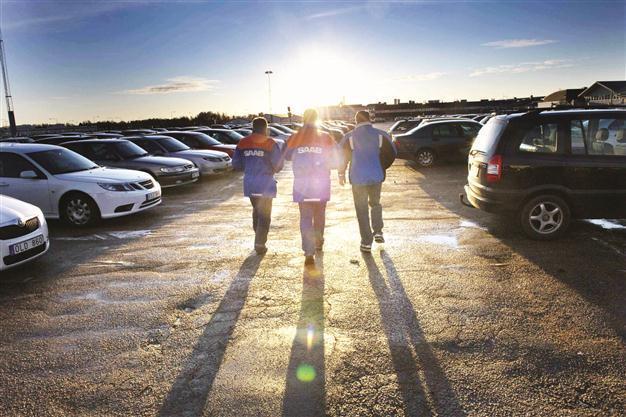Acquiring Saab too risky for Turkish firms, minister says
Gökhan Kurtaran ISTANBUL

Workers at the Swedish car manufacturer Saab Automobile leave the factory in Trollhattan, southwestern Sweden, on Dec 19. The Swedish officials are concerned about the future of Saab employees who are facing a risk of losing their jobs soon. AFP photo
Acquiring Saab would be a risky investment, according to industry experts who say turning the recently bankrupt Swedish firm into a globally profitable company requires nearly a $1.5 billion investment.Turkish Industry Minister Nihat Ergün, though enthusiastic about building the country’s first national car, also has doubts on the issue.
Saab’s potential was not very high, the minister said during a meeting in Istanbul yesterday. “Turkish investors should see the iceberg under the water,” he said, warning businesses on Saab’s possible hidden debts.
“Despite the high quality of Saab motors, still, acquiring them would be too costly,” Emre Özpeynirci, automotive expert and Hürriyet columnist, told the Hürriyet Daily News during a phone interview yesterday. “A possible buyer of the company has to spend at least $1.5 billion to put Saab back on track.”
Saab sold nearly 30,000 vehicles across the world last year. “There is not much hope in wasting money on a bankrupt firm in the midst of the European crisis,” Özpeynirci said.
Another risk ahead of a possible buyer is that the firm’s royalties might not be owned since the company first started as an aerospace firm, manufacturing parts for the defense industry in Sweden, he said. “It is too risky to not even be able to use the brand after spending so much on the bankrupt firm.”
Özpeynirci said company executives are still in talks with large Turkish firms. “I know some people from Saab keep trying to convince Turkish firms to acquire the company. The Swedish government is concerned about Saab employees who would soon lose their jobs.”
But Turkish companies are no longer interested in Saab since the Turkish government is not backing such an acquisition, said Özpeynirci.
“Saab has marketed nearly the same models over the last 15 years,” said İlker Pehlivan, automotive expert and daily Vatan columnist, noting that developing a new model would cost the company nearly $500 million. “Turkey could well make its own investment since the country has already significant experience in automotive industry.”
He said that one of the possible buyers of the firm, board chairman of Koç Holding Mustafa Koç, has already stated that the holding prefers not to buy a bankrupt firm.
“I want to ask to people who think it would be a good idea to acquire Saab why there is not even a single company around interested in buying the company,” said Ercan Tezer from the Motor Vehicle Manufacturers Association on the phone yesterday.
Turkish Deputy Prime Minister Ali Babacan also expressed his concerns about a possible Saab acquisition. “Saab is an old and well-placed brand globally, which makes it affordable to market the brand. Still, acquiring the firm would bring many problems with it,” Babacan said earlier.
“Acquiring the firm would bring surprising commitments, problems and responsibility. There are many other firms like Saab around, but we want to create our own car.”
















